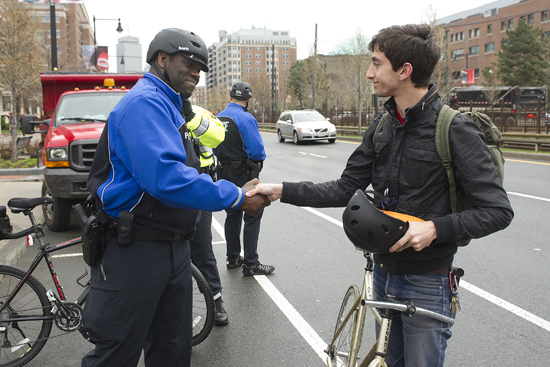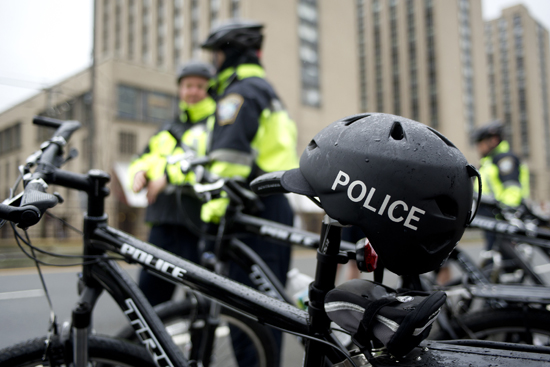Bikers Nabbed in Sting Operation
Police hope to boost helmet use

Tuesday’s morning commute was anything but typical for Benjamin Arnold. A police officer pulled him over in the bike lane by the Granby Street parking lot and issued him a ticket for not wearing a helmet. Reporters from local TV stations then swarmed in for his reaction. Soon, the officer returned with a free helmet.
“I’ve had my helmet stolen three times,” says Arnold (CAS’12), twice in Allston and once close to his home near the Berklee College of Music. Arnold knows better than to ride without a helmet: “My father’s a neurologist. He’d be on my ass about this.”
The BU junior was among at least 100 people given fake tickets, free bike helmets, and a friendly handshake from BU, Brookline, and Boston bicycle patrol officers in what organizers jokingly call a “shock and awe” sting operation designed to promote bike safety. Stationed along Commonwealth Avenue, the officers handed out neon orange tickets, with MassBike’s rules of the road printed on one side and a 20 percent off coupon on locks and helmets at Landry’s Bicycles on the other.
“The goal is to make this a friendly exchange between officers on bikes and those who cycle across our campus on a daily basis,” says Webb Lancaster, director of operations for Auxiliary Services.
The University’s Bike Safety Committee and the Office of Judicial Affairs organized the event to educate cyclists about the state’s 2009 biking legislation and to distribute free helmets, lights, and tire changing kits.

According to Massachusetts law, bicyclists can be fined $20 for violating driving laws—such as running a red light—or for biking in the dark without front and rear lights. The law also requires bikers 16 and younger to wear helmets.
BU Police Department officers will start ticketing riders who violate state law, says Sergeant Larry Cuzzi, who directs the department’s mountain bike unit.
“We’re not trying to be the bad guys, but we’re not wanting to respond to an abundance of bicyclists or pedestrians being hit,” Cuzzi says.
Organizers of Tuesday’s sting hope their efforts to boost helmet use will reduce the number of injuries from bicycle accidents. From July through September 2010, 141 bicycle and car accidents—3 of them fatal—were reported to the Boston Police Department, according to Captain John Danilecki. Not surprisingly, the top two danger zones were Massachusetts Avenue and Commonwealth Avenue, BU’s backyard and main drag.
Approximately 16 bicycle accidents—none of them life-threatening—have been reported to the BUPD since September, Cuzzi says. “If we can reduce that in any way, even by one, then that’s why we’re out there.”
The BU Cycling Safety Survey, sponsored every other year by the BU Bike Safety Committee, found that nearly 48 percent of bicyclists on the Charles River Campus do not always wear helmets. Many said it was the inconvenience of carrying a helmet or their unfashionable look, not the cost, that led them to avoid wearing one.
Taylor White (COM’12) can sympathize. “It messes up my hair,” White told an officer Tuesday morning with a self-conscious laugh. She asked him for a medium-sized white helmet. “This one will fit with my hair clips in.”
University officials hope students will use their gift certificates to buy sturdy bike locks as well. The BUPD recommends U-locks instead of chain or cable locks, which can easily be snipped with bolt cutters. Over the next 18 months, officers will tag bikes using inferior locks with 20 percent off coupons to buy helmets or locks at Landry’s Bicycles.
Better bike locks could prevent theft on campus, which has more than doubled in the past year. From September to December 2010, Cuzzi says, 60 bike thefts were reported, up from 26 during the same period the year before. The BUPD has since increased patrols in high-theft areas and installed camera systems to catch thieves.
Leslie Friday can be reached at lfriday@bu.edu; follow her on Twitter at @lesliefriday.
Comments & Discussion
Boston University moderates comments to facilitate an informed, substantive, civil conversation. Abusive, profane, self-promotional, misleading, incoherent or off-topic comments will be rejected. Moderators are staffed during regular business hours (EST) and can only accept comments written in English. Statistics or facts must include a citation or a link to the citation.